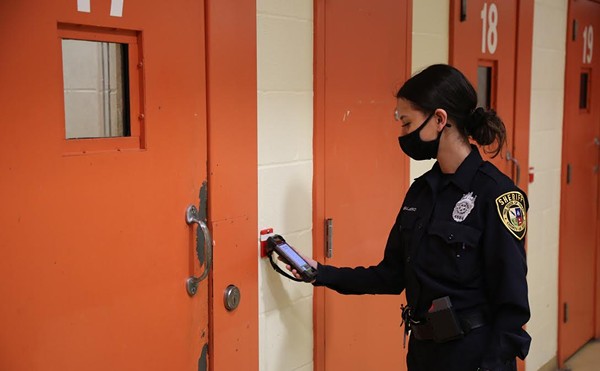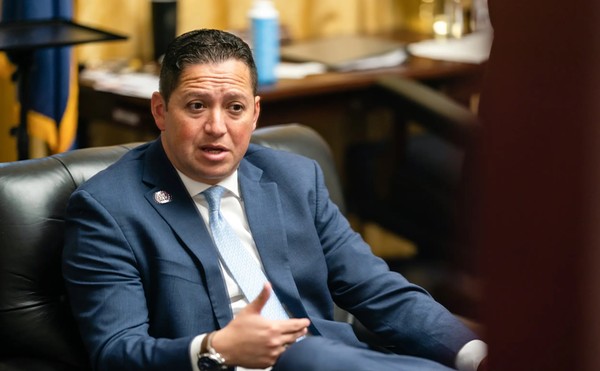Council distress
It’s long been understood that low pay and term limits play a dual role in limiting the city’s ability to attract and retain qualified, truly independent candidates to our City Council. But a report released last week by the Pew Charitable Trusts puts in perspective just how low our politicos’ wages really are. The Philly-centric study (pewtrusts.org) compares council pay in the largest 10 U.S. cities and a handful of others, and San Antonio’s council is the lowest paid of the bunch. While Los Angeles councilmembers earn the most, at $178,000 a year, SA was at the bottom of the heap at a mere $1,400.
Across the nation, the trend has been to move toward a “professional” council system, where members are paid living wages. The shift allows for residents of more modest incomes to participate, said Steven Neiheisel, chair of political science at St. Mary’s University. With the current model, San Antonio is mostly limited to “the lawyers, the business people, other professionals with professional schedules.”
As voters come to terms with two recent ethics-based flaps (criticism of District 9’s Elisa Chan for working to wrangle $300,000 in questionable funding for a Northside neighborhood; District 3’s Jennifer Ramos for allegedly using her position to benefit her primary employer, WellMed), the case for a professional council grows even starker. The current system, according to Neiheisel, “opens up the possibilities for ethics violations. It opens up the possibilities for conflicts of interest. It opens up the possibility that they are distracted from the city’s business because they need to maintain their professional business.”
Our council-manager set-up also has an added consequence of keeping the remarkably underpaid council in a somewhat subservient status to the overly endowed City Manager, who vaulted the $350,000 mark last year.
Yet a call for a living wage is also potential political suicide. Term-limited former Mayor Phil Hardberger may have been able to rouse the city to expand term limits for our city electeds in 2008 from two two-year terms to four two-year terms, but it will likely take a strong outsider to make the case for realistic compensation. One place voters aren’t ready to hear the argument made is out of Ramos’ office.
Pregnant kids
Meanwhile, as state lawmakers sharpen their budget whackers to crack down on socialistic social services, cases of child abuse, poverty, and teen pregnancy are higher than they’ve been in a decade. An analysis of state and federal data by the Center for Public Policy Priorities shows that child poverty in Texas has gone up 17 percent in 10 years (24.3 percent statewide in 2009, 25.1 in Bexar County), leading some of the jaded among us to start reinspecting Governor Rick Perry’s suggestion in his inaugural address last month that Texans “always take care of the least among us.” But judging from the very next line, it’s clear he’s talking about our struggling families stepping into the breach left by a retreating state government. You may recall the next line went: “the frail, the young, the elderly on fixed incomes, those in situations of abuse and neglect, people whose needs are greater than the resources at their disposal … can count on the people of Texas to be there for them.”
However, alternatives to cushion the fall aren’t being sought too vigorously. The CPPP’s report, “The State of Texas Children 2011,” shows pregnancies among unmarried teens in Texas rose 7 percent to nearly 45,000 cases a year; cases of child abuse or neglect spiked 27 percent since 2000, with over 68,000 confirmed cases in 2009; and infant mortality in Texas also rose 10 percent in the past decade. If this is caring for the least among us, well, we’re doing a piss-poor job already.
In Bexar County, cases of child abuse and neglect spiked — from 3,573 in 2000 to 5,727 confirmed cases in 2009. A perfect time for the proposed $200-million slashing of Child Protective Services, wouldn’t you agree, Mr. Perry?
Not one to blow a Tea Party photo op, Perry chided the media at this week’s State of the State (no, QueQue was not mentioned directly) and “big government interest groups” for whipping up fear over the state’s budget crisis, blaming the union for “doing their best to convince us that we’re facing a budget Armageddon.” Well, maybe not all of us.
Enterprising ideas
Not that some aren’t seeking more humane paths through the murk. Last week, Haven for Hope Director George Block, whose organization relies on nearly $2 million in state funds for its $10 million budget, caught one of those endangered rays of sunshine up in Austin.
At a Senate Finance Committee hearing, SFC chair Steve Ogden, R-Bryan, tossed up a novel idea to help keep charities like Haven for Hope afloat — tapping the Texas Enterprise Fund.
Texas has used the incentive fund, created in 2003, to help draw business and industry to the state. The fund has long been seen as one of the state’s most competitive recruitment tools, with Perry’s office calling it a “deal-closing fund.”
Referring to Block’s nonprofit, Ogden remarked, “When they’re taking these people off the street, not only are they getting them dried out and getting them off drugs, but they’re also finding them jobs. … You know, the Enterprise Fund the governor has that’s supposed to create jobs? I’m not sure why something like this wouldn’t deserve to be considered in that funding stream like bringing XYZ Corporation down here.”
Each night roughly 2,500 people sleep on the streets of San Antonio, 47 percent of whom are children, according to Haven for Hope. Meanwhile, the organization estimates that jail and emergency care for San Antonio’s homeless account for more than $41 million in taxpayer expenses each year. But it remains to be seen if any legislators will push the idea.
Sure, blame the fattie
And in the midst of the slash-and-burn madness that has targeted services to the state’s most vulnerable, State Comptroller Susan Combs is also seeking to fillet our flab — and we don’t mean the overloaded bureaucratic variety.
In a just-released report, she states that obesity cost Texas businesses $9.5 billion in 2009. By 2030, she said, it could cost Texas employers over $32 billion in additional expenses. “This is a battle we cannot afford to lose,” she writes.
The comptroller’s office put out a similar study in 2007, estimating the cost of obesity to Texas businesses at $3.3 billion per year. Since that time, the weight of our collective weight has (apparently) tripled.
In setting the figure, Combs’ office looked at health insurance payments by employers, disability health care costs, and the indirect cost of poor productivity and absenteeism due to obesity (QueQue has been known to take an occasional fat day). In 2009, 29.5 percent of adult Texans were obese, while 66.7 percent of all adults in the state were overweight or obese, the report says. •
















